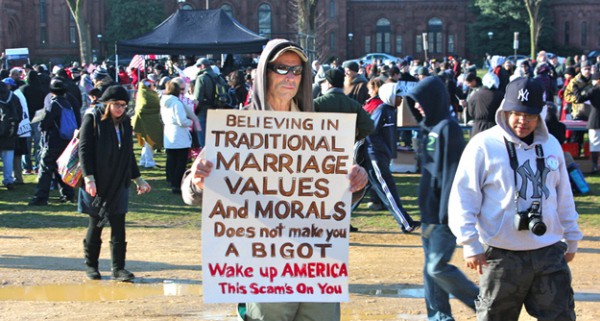
Last week, Brandon Ambrosino wrote in The Atlantic that “being against gay marriage doesn’t make you a homophobe,” defending Cardinal Timothy Dolan’s claim that the Catholic Church is unfairly “caricatured” as anti-gay. Responding to The Huffington Post’s Paul Raushenbush’s claim that there was nothing unfair about the portrayal, Ambrosino argued that many people can distinguish between supporting gay people and opposing gay issues. The National Organization for Marriage, chief opponents of marriage equality, quite liked his argument, highlighting this excerpt:
Raushenbush hauled out a familiar argument: “Let’s just be very clear here — if you are against marriage equality you are anti-gay. Done.”
As a gay man, I found myself disappointed with this definition — that anyone with any sort of moral reservations about gay marriage is by definition anti-gay. If Raushenbush is right, then that means my parents are anti-gay, many of my religious friends (of all faiths) are anti-gay, the Pope is anti-gay, and — yes, we’ll go here — first-century, Jewish theologian Jesus is anti-gay.
Others in the LGBT blogosphere have responded to Ambrosino’s piece with sharp rebukes. Slate Outward Contributor Mark Joseph Stern aptly characterized the argument as a “riff on the old saw ‘love the sinner, hate the sin,’” while HuffPost Gay Voices Editor Noah Michelson provided a handy guide for determining whether a person really is anti-gay or not.
As editor of ThinkProgress LGBT, I have regularly labeled groups and individuals as “anti-gay,” “anti-transgender,” and “anti-LGBT.” In fact, I’ve even used the b-word — bigoted — to describe those who openly oppose the freedom to marry or other forms of marriage equality. That’s because these descriptors are apt; “bigotry,” in particular, accurately describes individuals who discriminate against a class of people because of prejudiced ideas they have about that group. Stern contends that this “vilification” isn’t helpful, because it provides conservatives with “more fodder to claim that equality proponents are the true intolerant bullies,” but such concessions may very well fuel the effectiveness of those very claims.
Opponents of LGBT equality have been very eager to cover up the notion that animus has been the driving force behind their anti-gay advocacy, whether it was their support for discriminatory laws like “Don’t Ask, Don’t Tell” (DADT) and the Defense of Marriage Act (DOMA) or their ongoing opposition to marriage equality and nondiscrimination protections. The reason for this is two-fold. First, and most obviously, these groups know that it’s better PR for them if they look like they’re motivated by being “pro-family” or “pro-children” instead of “anti-gay.” It’s no different than opponents of abortion who want to sound like they’re “pro-life” instead of against a woman’s right to choose what she does with her own body. Claiming that they are somehow the victims because of labels like “bigot” or “homophobe” has been the centerpiece of this strategy, but it’s a rewriting of history. One group has been consistently subjected to violence and deprived of equal participation in society, while the other has simply been called out for maintaining that inequality; they are the latter.
Moreover, these groups are also hoping to legally prevent the courts from considering sexual orientation with what’s called heightened scrutiny, which would grant the gay community elevated protection from discrimination, just as sex and race are similarly classified. One of the courts’ “prongs” for considering this classification is whether the group has suffered discrimination, so conservatives are hoping they can make it look like they don’t oppress gay people so that gay people don’t look they’ve been oppressed. In their attempts to rewrite history, they have painted themselves into some interesting rhetorical corners, arguing against adoption even for straight couples, or claiming that marriage prevents old straight men from cheating with young women who can still get pregnant. Though the Supreme Court stopped short of heightened scrutiny in their DOMA decision, Justice Elena Kagan was not impressed by this strategy, highlighting a 1996 House report that clearly stated that lawmakers passed DOMA to “express moral disapproval of homosexuality.”
“Love the sinner, hate the sin,” as Stern referenced, is an oft-used slogan that actually helps sugarcoat a distorted view of what it means to be gay. It separates out sexual identity from sexual behavior — as if that were possible — such that people can actually believe they can support discrimination against gay people while still loving and supporting gay people. At its most extreme, this distinction is used to justify harmful ex-gay therapy or the equivalent religious condemnation of celibacy, a life without love. Ambrosino seems to buy into this false notion, believing that “someone could ideologically disapprove of my sexual expression while simultaneously loving and affirming my larger identity.” Intention, he argues, is what separates out those who are actually “malicious,” and thus anti-gay, from those who are simply “misguided,” a group Ambrosino would not label as bigots.
But this is a distinction without a difference, and seems to only demonstrate how effective conservatives have been when it comes to polishing their talking points. A person is anti-gay if what they say or do reinforces disrespect or inequality for the gay community, regardless of whether that was their intention or not. Prejudices, after all, are often built on misinformation, but ignorance doesn’t excuse — let alone mitigate — the harms those prejudices can cause. As Michelson writes, a person doesn’t have to belong to the Westboro Baptist Church in order to still be “part of the problem” — even if they belong to the queer community, like Ambrosino does.
Labeling bigotry as “bigotry” or calling those who oppose marriage equality “anti-gay” does not, as Ambrosino claims, “end civil discussion” or “degrade the foundation that undergirds a democratic, pluralistic society.” In contrast, such accurate terms can reinforce that positions against LGBT equality should be treated as taboo, rather than as understandable or defensible.
